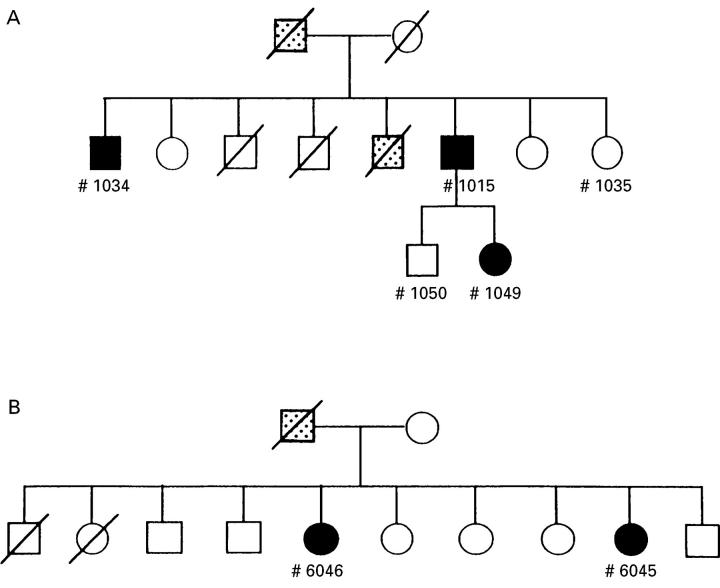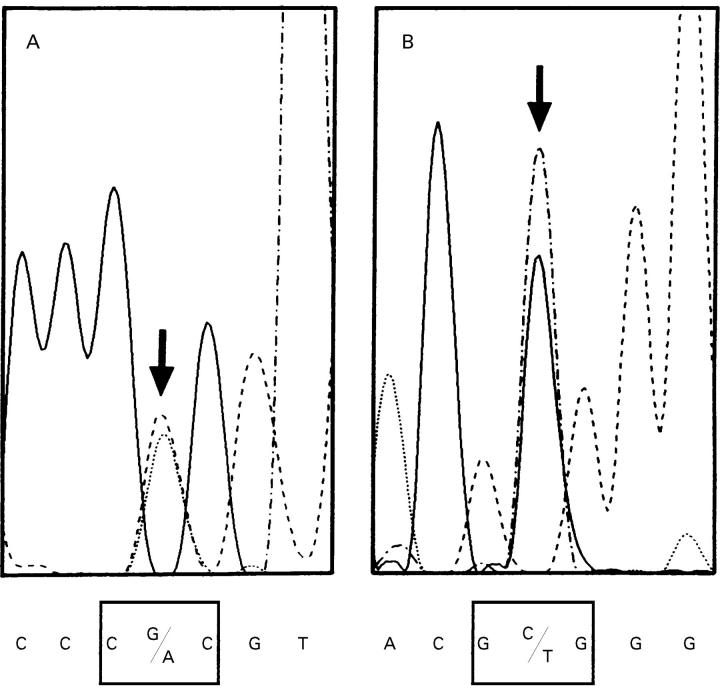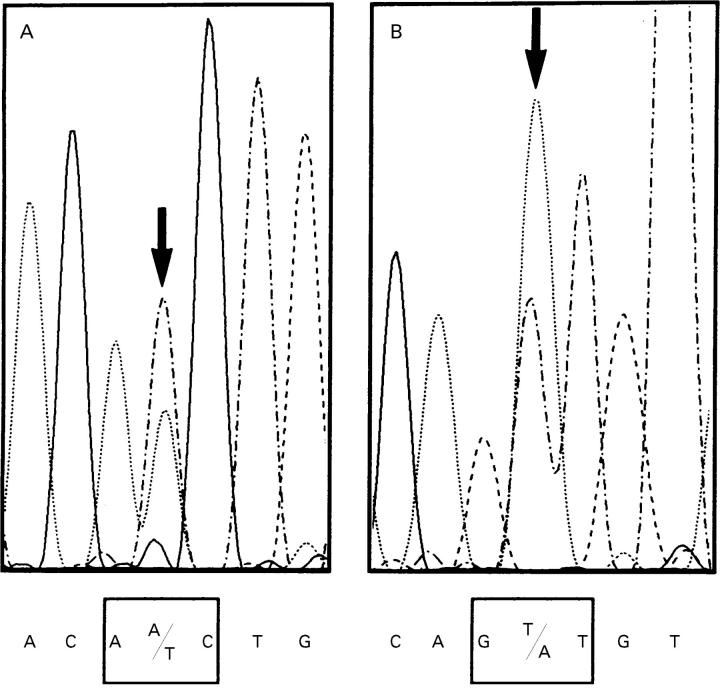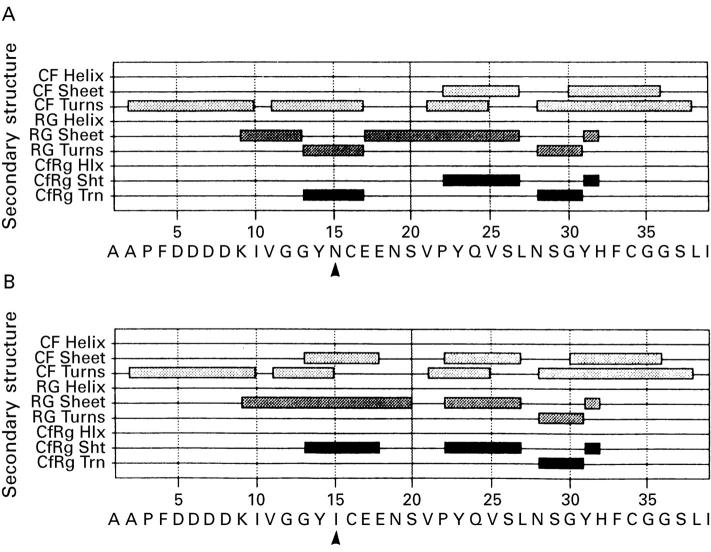Abstract
Background/Aims—Single-point mutations in the cationic trypsinogen gene have been reported in hereditary pancreatitis kindreds in the white population. The aim of the present study was to investigate whether similar gene mutations are present in Japanese hereditary pancreatitis kindreds. Methods—All five exons of the cationic trypsinogen gene were amplified by polymerase chain reaction and sequenced in six Japanese families with hereditary pancreatitis. Results—Two types of single-point mutation in the cationic trypsinogen gene, which were identical with those reported in white families with hereditary pancreatitis, were observed in separate Japanese families with hereditary pancreatitis: 21Asn (AAC) to Ile (ATC) (N21I) in exon 2 and 117Arg (CGC) to His (CAC) (R117H) in exon 3. Pancreatitis occurred at more advanced ages in patients with the N21I mutation than in those with the R117H mutation. Besides normal polymorphisms in exons 4 and 5, no mutation was found in patients in the remaining four families with hereditary pancreatitis, 21 patients with sporadic chronic pancreatitis, or five normal subjects. Conclusions—These results show heterogeneity, but no racial specificity, in the cationic trypsinogen gene mutations in hereditary pancreatitis kindreds. A distinctive clinical feature for each of the mutation types is suggested: adult onset for the N21I mutation and childhood onset for the R117H mutation.
Keywords: hereditary pancreatitis; pancreatitis; trypsinogen; gene mutation; Japanese
Full Text
The Full Text of this article is available as a PDF (163.5 KB).
Figure 1 .
Pedigrees of patients with hereditary pancreatitis (HP) with the mutation in the cationic trypsinogen gene. In one HP family (A; family number 1000), the R117H mutation in exon 3 was found in three affected members (1015, 1034, and 1049; see fig 2) but not in two unaffected members (1035 and 1050). In another HP family (B; family number 6000), the N21I mutation in exon 2 was identified in two affected members (6046 and 6045; see fig 3). A closed square or circle indicates a patient with pancreatitis, and a stippled symbol indicates family members suspected of having pancreatitis based on available clinical records.
Figure 2 .
DNA sequencing electropherograms of the human cationic trypsinogen gene exon 3 in the region of the mutation identified in patients with hereditary pancreatitis (HP) (A, forward sequencing; B, reverse sequencing). Heterozygosity at the second nucleotide in the frame (G/A) was shown in three affected members but not in two unaffected members in HP family 1000 (see the pedigree in fig 1A). This point mutation was predicted to result in an Arg (CGC) to His (CAC) substitution.
Figure 3 .
DNA sequencing electropherograms of the human cationic trypsinogen gene exon 2 in the region of the mutation identified in patients with hereditary pancreatitis (HP) (A, forward sequencing; B, reverse sequencing). Heterozygosity at the second nucleotide in the frame (A/T) was shown in two affected members in HP family 6000 (see the pedigree in fig 1B). This point mutation was predicted to result in an Asn (AAC) to Ile (ATC) substitution.
Figure 4 .
Chou-Fasman and Robson-Garnier secondary structure predictions on the predicted amino acid sequences of wild type and mutant (N21I) cationic trypsinogen (CT). Computer analysis showed that the N21I substitution (arrowheads) alters the native turn structure of the flanking region of wild type CT (A) to sheet structure on mutant CT (B). It is noteworthy that 21Ile is found in the corresponding amino acid sequence of anionic trypsinogen, which is another of the trypsinogen isoforms, meaning that the amino acid sequence presented in B (39 residues long) is identical with that of anionic trypsinogen. CF, Chou-Fasman prediction; RG, Robson-Garnier prediction; CfRg, Chou-Fasman and Robson-Garnier combined prediction; Helix or Hlx, helix structure; Sheet or Sht, sheet structure; Turns or Trn, turn structure.
Selected References
These references are in PubMed. This may not be the complete list of references from this article.
- COMFORT M. W., STEINBERG A. G. Pedigree of a family with hereditary chronic relapsing pancreatitis. Gastroenterology. 1952 May;21(1):54–63. [PubMed] [Google Scholar]
- Emi M., Nakamura Y., Ogawa M., Yamamoto T., Nishide T., Mori T., Matsubara K. Cloning, characterization and nucleotide sequences of two cDNAs encoding human pancreatic trypsinogens. Gene. 1986;41(2-3):305–310. doi: 10.1016/0378-1119(86)90111-3. [DOI] [PubMed] [Google Scholar]
- Gorry M. C., Gabbaizedeh D., Furey W., Gates L. K., Jr, Preston R. A., Aston C. E., Zhang Y., Ulrich C., Ehrlich G. D., Whitcomb D. C. Mutations in the cationic trypsinogen gene are associated with recurrent acute and chronic pancreatitis. Gastroenterology. 1997 Oct;113(4):1063–1068. doi: 10.1053/gast.1997.v113.pm9322498. [DOI] [PubMed] [Google Scholar]
- Homma T., Harada H., Koizumi M. Diagnostic criteria for chronic pancreatitis by the Japan Pancreas Society. Pancreas. 1997 Jul;15(1):14–15. doi: 10.1097/00006676-199707000-00002. [DOI] [PubMed] [Google Scholar]
- Le Bodic L., Bignon J. D., Raguénès O., Mercier B., Georgelin T., Schnee M., Soulard F., Gagne K., Bonneville F., Muller J. Y. The hereditary pancreatitis gene maps to long arm of chromosome 7. Hum Mol Genet. 1996 Apr;5(4):549–554. doi: 10.1093/hmg/5.4.549. [DOI] [PubMed] [Google Scholar]
- Le Bodic L., Schnee M., Georgelin T., Soulard F., Ferec C., Bignon J. D., Sagniez M. An exceptional genealogy for hereditary chronic pancreatitis. Dig Dis Sci. 1996 Jul;41(7):1504–1510. doi: 10.1007/BF02088580. [DOI] [PubMed] [Google Scholar]
- Lowenfels A. B., Maisonneuve P., DiMagno E. P., Elitsur Y., Gates L. K., Jr, Perrault J., Whitcomb D. C. Hereditary pancreatitis and the risk of pancreatic cancer. International Hereditary Pancreatitis Study Group. J Natl Cancer Inst. 1997 Mar 19;89(6):442–446. doi: 10.1093/jnci/89.6.442. [DOI] [PubMed] [Google Scholar]
- Pandya A., Blanton S. H., Landa B., Javaheri R., Melvin E., Nance W. E., Markello T. Linkage studies in a large kindred with hereditary pancreatitis confirms mapping of the gene to a 16-cM region on 7q. Genomics. 1996 Dec 1;38(2):227–230. doi: 10.1006/geno.1996.0620. [DOI] [PubMed] [Google Scholar]
- Perrault J. Hereditary pancreatitis. Gastroenterol Clin North Am. 1994 Dec;23(4):743–752. [PubMed] [Google Scholar]
- Rowen L., Koop B. F., Hood L. The complete 685-kilobase DNA sequence of the human beta T cell receptor locus. Science. 1996 Jun 21;272(5269):1755–1762. doi: 10.1126/science.272.5269.1755. [DOI] [PubMed] [Google Scholar]
- Sarles H., Camarena J., Bernard J. P., Sahel J., Laugier R. Two forms of hereditary chronic pancreatitis. Pancreas. 1996 Mar;12(2):138–141. doi: 10.1097/00006676-199603000-00005. [DOI] [PubMed] [Google Scholar]
- Shah S., Amarapurkar D., Pitchumoni C. S. Hereditary pancreatitis. Am J Gastroenterol. 1994 Jun;89(6):928–930. [PubMed] [Google Scholar]
- Whitcomb D. C., Gorry M. C., Preston R. A., Furey W., Sossenheimer M. J., Ulrich C. D., Martin S. P., Gates L. K., Jr, Amann S. T., Toskes P. P. Hereditary pancreatitis is caused by a mutation in the cationic trypsinogen gene. Nat Genet. 1996 Oct;14(2):141–145. doi: 10.1038/ng1096-141. [DOI] [PubMed] [Google Scholar]
- Whitcomb D. C., Preston R. A., Aston C. E., Sossenheimer M. J., Barua P. S., Zhang Y., Wong-Chong A., White G. J., Wood P. G., Gates L. K., Jr A gene for hereditary pancreatitis maps to chromosome 7q35. Gastroenterology. 1996 Jun;110(6):1975–1980. doi: 10.1053/gast.1996.v110.pm8964426. [DOI] [PubMed] [Google Scholar]






